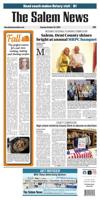University of Missouri Extension is expanding its “Freeze It!” food waste reduction program across rural Missouri.
Food waste is an escalating environmental and health issue, says MU Extension nutrition and health specialist Rachel O’Halloran. The “Freeze It!” program responds to this challenge by empowering rural families to better manage their meals and reduce waste through strategies like meal planning, freezing meals and sharing excess food, she says.
Funding for the expansion is through a grant from the North Central Regional Center for Rural Development.
“Our goal is to reduce food waste and promote healthy, home-cooked meals, especially in rural areas where access to waste diversion programs and health education can be limited,” O’Halloran says. “This grant allows us to build capacity and reach more families with proven strategies that make a difference.”
The grant will support delivery of eight “Freeze It!” program series in rural Missouri communities, professional development for MU Extension health faculty on partnering with local waste management agencies and development of a statewide infrastructure for long-term support of the program.
O’Halloran says pilot programs have already shown promising results, reaching more than 75 rural residents and achieving measurable reductions in household food waste. “Freeze It!” participants report cooking more meals at home, eating healthier and wasting less, all while saving money, she says.
The program also addresses critical health disparities in rural Missouri, where residents face higher rates of diet-related illnesses, poverty and limited access to nutrition education, says MU Extension nutrition and health specialist Carrie Elsen.
“By teaching effective meal management and food literacy, we’re not just reducing waste, we’re improving lives,” Elsen says.
The project, “Addressing Household Food Waste in Rural Communities,” is led by O’Halloran, Elsen and Sarah Wood, assistant extension professor in the MU Department of Health Sciences.
















